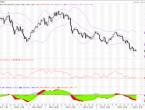EUR/USD
1.17858
0.110%
Gold
5096.86
2.005%
Oil
66.320
-0.480%
USD/JPY
155.059
0.041%
GBP/USD
1.34890
0.196%
GBP/JPY
209.162
0.248%
February 22nd - According to foreign media analysis, Nvidia has played a key role in driving the stock market to record highs for years. However, with growing skepticism about artificial intelligence, Wall Street is increasingly worried that the chip giants earnings report next week, regardless of the outcome, will depress its stock price. Nvidias stock price has been trading sideways for months, a significant setback for a company that was recently a leading index performer and achieved triple-digit year-over-year gains. Investors expect Nvidias earnings next week to exceed Wall Street expectations and raise forecasts for the next few quarters. But this may not be enough to boost the stock price. Meanwhile, if Nvidias performance fails to quell investor anxiety about artificial intelligence, it could lead to greater volatility in AI-related stocks and the broader market.February 22 - Libyas state-owned Arabian Gulf Oil Company (AGOCO) announced on Sunday that the Sinawan oil field in the Nalut region of western Libya has resumed production. The field had been shut down for over three years due to financial and technical problems. Under normal operating conditions, the field can produce up to 20,000 barrels of oil per day.February 22 – According to AXIOS, a senior U.S. official said on Sunday that if U.S. negotiators receive a detailed nuclear agreement proposal from Iran within the next 48 hours, they are prepared to hold a new round of talks with Iran in Geneva on Friday. The U.S. official stated that the current diplomatic efforts may be the last chance President Trump is giving Iran before launching a large-scale U.S.-Israel joint military operation (potentially targeting Iranian Supreme Leader Khamenei). The senior U.S. official indicated that the Trump administration is awaiting Irans proposal.U.S. Trade Representative Greer: We will continue the trade investigation so that we can impose tariffs.U.S. Trade Representative Greer: We will explore policy continuity issues after the tariffs imposed under Section 122 expire.











